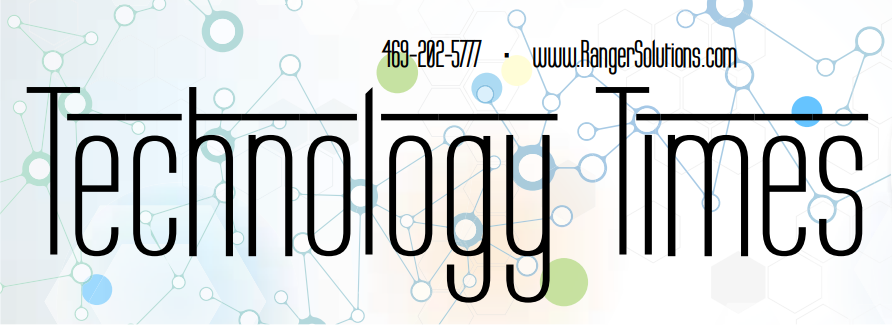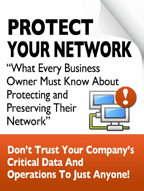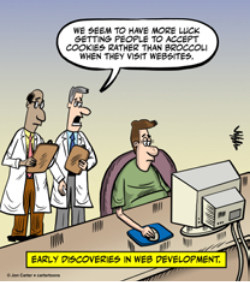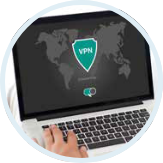
May 2021

Think Again By Adam Grant

Think Again: The Power Of Knowing What You Don’t Know by Adam Grant arrives at a time when things are changing fast. Over the last year, we’ve had to learn to adapt – or get left behind. In Think Again, Grant walks readers through different ways of seeing things. For instance, he discusses the art of being wrong and how we can be better at it. Or how we can be better (or different) problem-solvers and critical thinkers. Think Again is for readers who are looking to be challenged to have an open mind in regard to new ideas – because that’s how we grow!
How To Make Cyber Security An Ingrained Part Of Your Company Culture
Your employees are your first line of defense when it comes to protecting your business from cyberthreats. Human error is one of the single biggest culprits behind cyber-attacks. It comes down to someone falling for a phishing scam, clicking an unknown link or downloading a file without realizing that it’s malicious.
Because your team is so critical to protecting your business from cyberthreats, it’s just as critical to keep your team informed and on top of today’s dangers. One way to do that is to weave cyber security into your existing company culture.
How Do You Do That?
For many employees, cyber security is rarely an engaging topic. In truth, it can be dry at times, especially for people outside of the cyber security industry, but it can boil down to presentation. That isn’t to say you need to make cyber security “fun,” but make it interesting or engaging. It should be accessible and a normal part of the workday.
Bring It Home For Your Team. One of the reasons why people are often disconnected from topics related to cyber security is simply because they don’t have firsthand experience with it. This is also one reason why many small businesses don’t invest in cyber security in the first place – it hasn’t happened to them, so they don’t think it will. Following that logic, why invest in it at all?
The thing is that it will eventually happen. It’s never a question of if, but when. Cyberthreats are more common than ever. Of course, this
also means it’s easier to find examples you can share with your team. Many major companies have been attacked. Millions of people have had their personal data stolen. Look for examples that employees can relate to, names they are familiar with, and discuss the damage that’s been done.
If possible, bring in personal examples. Maybe you or someone you know has been the victim of a cyber-attack, such as ransomware or a data breach. The closer you can bring it home to your employees, the more they can relate, which means they’re listening.
Collaborate With Your Employees. Ask what your team needs from you in terms of cyber
“For the day-to-day activities, creating a positive, educational, collaborative environment is the best way to make cyber security a normal part of your company culture.”
security. Maybe they have zero knowledge about data security and they could benefit from training. Or maybe they need access to better tools and resources. Make it a regular conversation with employees and respond to their concerns.
Part of that can include transparency with employees. If Julie in accounting received a phishing e-mail, talk about it. Bring it up in the next weekly huddle or all-company meeting. Talk about what was in the e-mail and point out its identifying features. Do this every time phishing e-mails reach your employees.
Or, maybe Jared received a mysterious e-mail and made the mistake of clicking the link within that e-mail. Talk about that with everyone, as well. It’s not about calling out Jared. It’s about having a conversation and not placing blame. The focus should be on educating and filling in the gaps. Keep the conversation going and make it a normal part of your company’s routine. The more you talk about it and the more open you are, the more it becomes a part of the company culture.
Keep Things Positive. Coming from that last point, you want employees to feel safe in bringing their concerns to their supervisors or managers. While there are many cyberthreats that can do serious damage to your business (and this should be stressed to employees),

you want to create an environment where employees are willing to ask for help and are encouraged to learn more about these issues.
Basically, employees should know they won’t get into trouble if something happens. Now, if an employee is blatantly not following your company’s IT rules, that’s a different matter. But for the day-to-day activities, creating a positive, educational, collaborative environment is the best way to make cyber security a normal part of your company culture.
Plus, taking this approach builds trust, and when you and your team have that trust, it becomes easier to tackle issues of data and network security – and to have necessary conversations.
Need help creating a cyber security company culture that’s positive? Don’t hesitate to reach out to your managed services provider or IT partner! They can help you lay the foundation for educating your team and ensure that everyone is on the same page when it comes to today’s constant cyberthreats.
Free Report: What Every Small-Business Owner Must Know About Protecting And Preserving Their Company’s Critical Data And Computer Systems

This report will outline in plain, nontechnical English the common mistakes that many small-business owners make with their computer networks that cost them thousands in lost sales, productivity and computer repair bills, and will provide an easy, proven way to reduce or completely eliminate the financial expense and frustration caused by these oversights.
Download your FREE copy today at
www.RangerSolutions.com/protect or call our office at 469-202-5777.

SHINY NEW GADGET OF THE MONTH
The Pocket Translator: MUAMA ENENCE

It used to be science fiction, but not anymore! Now, you can translate languages on the go! The Muama Enence is the device that makes it possible. This handheld “listener” is capable of real-time translation of over 36 common languages from around the globe. Smaller than a smartphone, the Muama Enence breaks language barriers and makes travel easier than ever before, whether you’re traveling for business or for vacation.
The Muama Enence is super-easy to use and ultra-portable. All you need to do is press a button, and it does the rest. Plus, with excellent audio quality, you’ll be able to hear the translation, even when things get busy around you. Learn more – and get your own – at bit.ly/37hhn8R.
Should You Be Using a VPN?

If you aren’t already using a VPN, or virtual private network, you’ve probably been wondering if you should. If you care about your data security (and personal security), then the answer is yes!
PNs offer an extra layer of protection when you access the Internet – wherever you access the Internet. They work by encrypting your data, which helps to keep prying eyes out. VPNs are a must-have for anyone working remotely, traveling or for those who simply want additional data security.
The bottom line is that a VPN gives you more control over your network. Examples of VPNs include NordVPN, ExpressVPN and ProtonVPN – though there are many more to choose from. It’s all about finding the one that best suits your needs.
Lead Like Your Life Depends On It

Great leaders are like drug addicts. Here’s what I mean by that: in my journey from being a homeless drug addict with no college degree to becoming a successful leader, I have learned that the leaders who are supposedly great, today and of the past, look like addicts in active addiction – they are fixing, managing and controlling perception to get what they want.
I look at the great leaders emerging today, and those who will surface tomorrow, and I see people who will lead in a fundamentally different way – they will look like addicts in recovery. But there’s more to it than that. Consider the following questions:
- In the last 30 days, have you said yes to something you could say no to?
- In the last 30 days, have you hit a weakness?
- In the last 30 days, have you avoided a difficult conversation?
- In the last 30 days, have you held back your unique perspective?
As leaders, we perform these “actions” all the time. I call them our “masks” because we’re hiding our true selves behind our actions.
Leaders teach others that they need to hide their vulnerabilities, imperfections or weaknesses in order to be successful. To put on a mask. I want to talk about taking off the mask (pandemic aside!), but this isn’t about any physical mask. It starts by identifying what mask is holding you back. These are the four masks:
- Saying Yes When You Could Say No
- Hiding A Weakness
- Avoiding Difficult Conversations
- Holding Back Your Unique Perspective
(You Don’t Speak Up When You Could/
Should)
You can learn more about the mask that’s holding you back at MaskFreeProgram.com. This is a free, five-minute assessment that will give you a clearer picture about which mask is holding you back. But more than that, it also gives you an authenticity rating – to help you determine how authentic you are.
What does authenticity have to do with masks? When you’re wearing a mask, you are not being authentic – your true self. This rating tells you how close you are to being your true self.
So, how do you remove the mask? How do you become more authentic? Mask recovery comes down to three principles:
- Practice Rigorous Authenticity — Be true to yourself all the time, no matter the cost.
- Surrender The Outcome — Leaders are taught to obsess over outcomes; focus on what you can control.
- Do Uncomfortable Work — With this emotional work, we need to take action that is good for us (saying no, having difficult conversations).
When you focus on these three principles, you become more authentic. You are able to grow and become the leader for the future – like an addict in recovery.

Michael Brody-Waite is a recovered drug addict who has since become a three-time CEO and TEDx speaker (with over 1.5 million views). He’s held a leadership role at a Fortune 50 company, he’s the founder of an Inc. 500 company, he’s led a nonprofit and he’s the author of Lead Like Your Life Depends On It: Why In A Pandemic Great Leaders Lead Like Drug Addicts.
How To Know It’s Time To Start Scaling Your Business
Creating a business that is scalable isn’t easy, but it’s necessary if you intend to grow – and grow some more. There are three simple ways to tell if you’ve created a business that is scalable.
You Have Positive Cash Flow Figured Out. You’ve successfully built a reliable month-to-month revenue stream. It’s money that you can use to invest further into your business – whether it’s to pay for additional employees, technology, systems and processes or all of the above.
Everything Has Been Delegated. Delegating is hard for many entrepreneurs. You want to have a hand in everything. But when your team keeps everything running – and everything runs even when you’re not there – you’re in a great place to scale up.
You Have More Control Over The People You Get To Work With. Basically, you can start to shape your client base. If there is someone you want to say no to (say you don’t have the full resources to fulfill their needs or they’re just not a great fit), you can move on guilt-free.
If you have these three things in place, you have the foundation to scale up safely and to create the business you’ve always wanted. Forbes, Feb. 11, 2021
HOW TO BUILD A FORWARD-THINKING
CUSTOMER CULTURE IN YOUR
SMALL BUSINESS
How well do you know your customers and clients? If you want to deliver a stellar customer experience and have a forward-thinking customer culture within your organization, you need to know your customers. What makes them tick? What do they love? Why do they make the decisions they make?
More than that, you need to go after the customers who make the most sense to your business. As you grow, you have more opportunity to be picky, so be picky! Develop the customer base you really want. That makes it easier to market to them, because you’re all on the same page.



